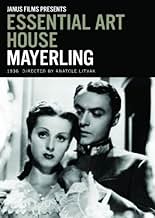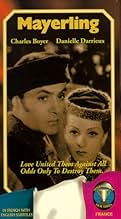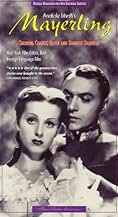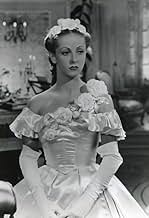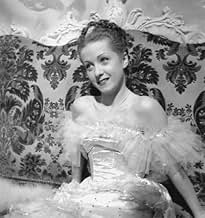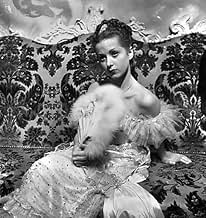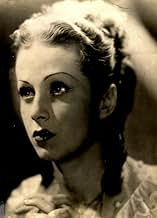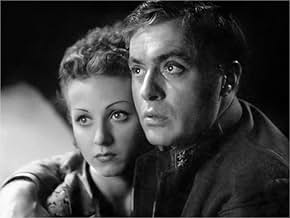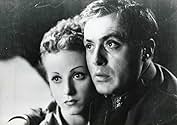Rodolfe, Crown Prince of Austria, is fettered on all sides. He's bored; his father, the emperor, is domineering; his politics are more liberal than his father's, but he knows his views carry... Read allRodolfe, Crown Prince of Austria, is fettered on all sides. He's bored; his father, the emperor, is domineering; his politics are more liberal than his father's, but he knows his views carry no weight. He agrees to marry a princess to sire an heir, then spends his nights as a pla... Read allRodolfe, Crown Prince of Austria, is fettered on all sides. He's bored; his father, the emperor, is domineering; his politics are more liberal than his father's, but he knows his views carry no weight. He agrees to marry a princess to sire an heir, then spends his nights as a playboy. In 1888, he meets Marie Vetsera, 17, a baroness' daughter. She is resolute, smitten,... Read all
- Awards
- 3 wins & 1 nomination total
- La baronne Vetsera
- (as Marthe Regnier)
- La cousine de Marie
- (as Assia)
- Une fille
- (as Ribès)
- Szeps
- (as Bergeron)
- Le chef de la police
- (as Sokoloff)
- Le premier policier
- (as Aimos)
- Le second policier
- (as Siméon)
Featured reviews
In this French-language version by Ukranian director Anatole Litvak, we get a highly-romanticised version of the story with Charles Boyer and Danielle Darrieux as the star-crossed but ill-fated lovers.
The direction throughout is stylish and tasteful, Litvak impressing in his recreation of the Viennese Court with its surface splendour barely concealing the jostling for position and rumour-mongering beneath the facade. Boyer and Darrieux are excellent in their lead roles, his character the reforming, rebellious heir to the throne, unhappy in his arranged marriage and she the youthful, highly-impressionable innocent caught up in the first great passion of her life.
The concluding climax is sensitively and humanely depicted too with my only major criticisms of the film being an over-reliance on the use of the no-doubt in-vogue montage sequences and a tendency to slightly overstay the camera's welcome in certain scenes.
Nevertheless, this was a fine retelling of the notorious scandal and it's no surprise that its artistic and commercial success lured director Litvak to Hollywood where he enjoyed a distinguished career for many years.
The story unfolds to the inevitable conclusion of murder/suicide which threw the Empire into turmoil. History may record the events of what happened at Mayerling a little differently but it surely makes a good story of thwarted love and royal politics. The 1968 remake with Omar Shariff and Catherine Deneuve is not bad either. This legendary romance has fascinated people since the turn of the century. So have the Kleenex handy and enjoy!!
"Mayerling" became the first international hit with sound in cinema (with a couple of British pictures the exception). The film's popularity made French actor Charles Boyer a major world-wide movie star, and a barrage of offers from Hollywood studios for Anatole Litvak cascaded on its director. One reviewer labeled the film as "one of the most compelling love stories the cinema has produced," and the co-founder of the American Ballet, Lincoln Kirstein wrote it is "a kind of standard for the romantic film in an historical setting." The movie's title derives from the small town in Austria where Rudolf, the Crown Prince of Austria (Boyer), shot and killed his 17-year-old mistress, baroness Mary Vetsera (Danielle Darrieux) at his hunting lodge in January 1889. Rudolf was the only son to Emperor Franz Joseph of Austria and had been in an unhappy marriage to a princess from Belgium before meeting Mary. Compounding the royal couple's stress was Rudolf had transmitted the clap to his wife as a result of his many affairs.
Actress Darrieux, as Mary Vetsera, was almost the same age of the real-life teenager who was shot by the prince before he took his own life. Her four-year film career to this point resulted in only small parts, but "Mayerling" brought her international fame. Receiving a number of offers from Hollywood, Darrieux and Litvak traveled together to explore their opportunities in Tinseltown. Whereas the film director remained in California where he excelled in directing several highly-regarded films, Darrieux was in only one Universal Pictures film, 1938 'The Rage of Paris,' before returning to Europe. Darrieux eventually became one of France's most popular movie actresses with a career spanning eight decades, lasting until 2010.
Boyer, who had earlier spent a short time in Hollywood, returned to California to enjoy a very rewarding life in films. The book the film's plot was based on, Claude Anet's 'Idyll's End,' served as the basis for Litvak revisiting the tragic tale in his 1957 'Mayerling' with Mel Ferrer and Audrey Hepburn. MGM pounced on the bandwagon in 1968 in its version of "Mayerling" with Omar Sharif, Catherine Deneuve, James Mason and Ava Gardner.
It's ironic Boyer played a character who kills himself over a woman. The actor met and married British actress Pat Paterson just before making "Mayerling," a marriage that lasted 44 years. He was so distraught over her death in August 1978, that he took his own life with an overdose of Seconal two days after she passed away. As for the real Crown Prince Rudolf, his death left his father, Franz Joseph, to seek an alternative when he had no other sons to give the title. The emperor's heir apparent to the Austria-Hungry throne turned out to be his nephew, Archduke Franz Ferdinand, who, in 1914 was shot and killed in Sarajevo, setting off World War One.
Did you know
- TriviaOne of the first foreign films with sound to become a hit in the United States. It made an international star out of Charles Boyer.
- ConnectionsFeatured in Scissors (1991)
Details
Box office
- Gross US & Canada
- $240,000
- Runtime
- 1h 36m(96 min)
- Color
- Aspect ratio
- 1.33 : 1

